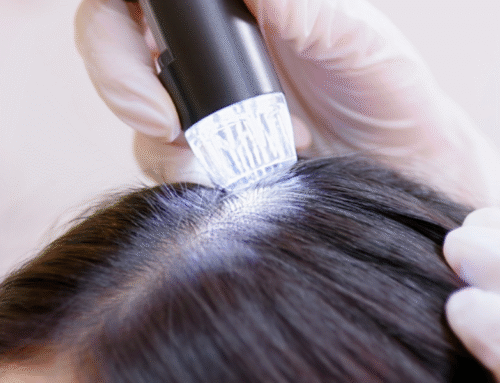Hair is much more than just an aesthetic feature—it’s a reflection of what’s happening inside your body. Among the many factors that influence its appearance, texture, and density, hormones play a key role. This becomes especially evident during two pivotal stages in many women’s lives: pregnancy and menopause.
Both moments involve significant hormonal fluctuations that can have noticeable—and sometimes surprising—effects on hair health. From thicker, shinier strands to sudden shedding or loss of volume, understanding what your body is going through during these phases can help you make informed choices and care for your hair more effectively.
In this article, we’ll explore how hormones impact your hair during pregnancy and menopause, and what you can do to keep it healthy, strong, and radiant.
Pregnancy: A Cycle of Abundance… and Postpartum Shedding
During pregnancy, the female body undergoes profound hormonal changes, one of the most prominent being a sustained increase in estrogen levels. This hormonal surge supports fetal development and maternal health—but also brings visible benefits to skin and hair. Many women report their hair looking fuller, shinier, and stronger during pregnancy. This is primarily due to estrogen prolonging the anagen (growth) phase of the hair cycle. As a result, hair fall decreases, and more strands remain in the growing phase longer, creating the sensation of more voluminous hair.
However, this effect is temporary. After childbirth, hormone levels drop rapidly, and all the hair that had been “retained” in the growth phase transitions simultaneously to the telogen (shedding) phase. This results in a type of hair loss known as postpartum telogen effluvium, which usually begins between 6 weeks and 3 months after delivery.
Is Postpartum Hair Loss Normal? How Long Does It Last?
Yes, it’s completely normal. Although seeing handfuls of hair in the shower or on your pillow can be alarming, this phenomenon is usually temporary and reversible.
Postpartum hair loss typically begins 6 to 12 weeks after childbirth and may last 3 to 6 months for most women. However, factors such as stress, sleep deprivation, breastfeeding, and poor nutrition can intensify or prolong the shedding.
To reduce its impact, consider the following tips:
• Maintain a diet rich in iron, biotin, and protein.
• Use hair products that strengthen the follicle and support healthy growth.
• Avoid tight hairstyles and excessive heat styling.
• Incorporate scalp massages to stimulate circulation and oxygenation.
Menopause: The Downshift in Hormones and Its Effects on Hair
While pregnancy brings a hormonal boost, menopause marks a decline. Between the ages of 45 and 55, estrogen and progesterone levels begin to drop steadily—and this hormonal shift has a direct impact on hair health.
Estrogen plays an important role in hydration, elasticity, and maintaining the hair growth cycle. As levels decline, androgens (male hormones) gain more influence, which can lead to:
• Finer, weaker hair
• General loss of volume
• Gradual thinning on the crown or frontal scalp
• Dryness and lack of shine
This pattern of hair loss is known as female androgenetic alopecia. While it may not be completely reversible, it can often be slowed down and managed with the right care.
How to Care for Your Hair During Menopause
Although hormonal changes are natural, adopting healthy habits and using targeted products can help preserve your hair’s strength and vitality during this stage.
Here are some effective strategies:
• Use strengthening shampoos and treatments with caffeine, biotin, peptides, or rosemary to support growth and root health.
• Add supplements containing zinc, vitamin D, iron, and collagen, always with medical supervision.
• Massage the scalp at least three times a week to boost microcirculation.
• Limit heat styling and avoid harsh chemical treatments like bleaching or straightening.
• Apply nourishing hair masks to restore elasticity and shine.
When Should You See a Specialist?
Whether you’re in the postpartum stage or going through menopause, it’s important to distinguish between normal hair shedding and excessive or prolonged loss. If you notice bald patches, significant thinning, or if hair loss is affecting your self-esteem, consult a dermatologist or trichologist. A professional diagnosis will help identify the exact cause and guide you toward the most effective treatment based on your hormonal and hair health.
Caring for Your Hair Is Also Self-Care
Hormonal changes are a natural part of the female journey. While they may bring visible changes to your hair, they also offer a chance to reconnect with yourself and adopt self-care routines that support you through each stage of life.
Whether you’re experiencing pregnancy, postpartum recovery, or menopause, you’re not alone. There are effective solutions, expert guidance, and specialized products available to help you maintain healthy, vibrant hair—no matter the phase you’re in.
Ready to transform your hair’s health?
At HairWise, we offer expert advice, treatments, and products to help your hair look stronger and healthier than ever. Discover our personalized hair care solutions and start giving your hair the attention it deserves.
Visit us at 245 SE 1st ST #201, Miami, FL 33131, and find the perfect treatment for you.
Your hair will thank you!







